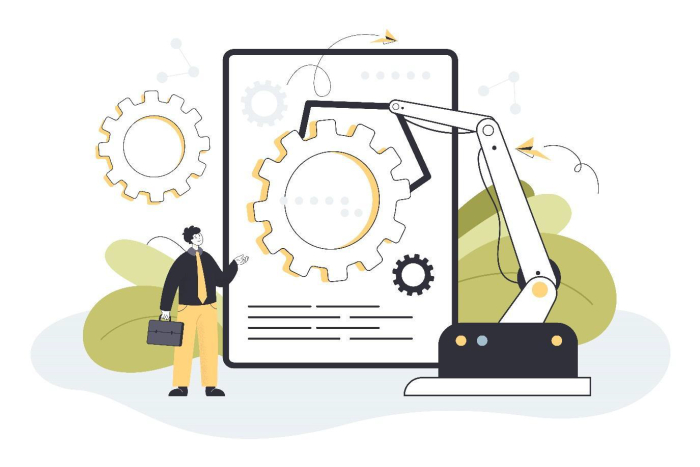
 Data Structure
Data Structure Networking
Networking RDBMS
RDBMS Operating System
Operating System Java
Java MS Excel
MS Excel iOS
iOS HTML
HTML CSS
CSS Android
Android Python
Python C Programming
C Programming C++
C++ C#
C# MongoDB
MongoDB MySQL
MySQL Javascript
Javascript PHP
PHP
- Selected Reading
- UPSC IAS Exams Notes
- Developer's Best Practices
- Questions and Answers
- Effective Resume Writing
- HR Interview Questions
- Computer Glossary
- Who is Who
Trends and Technologies Driving Digital Transformation
Businesses may implement innovations into every element and draw major changes by utilizing digital transformation. Ultimately, it produces new value for the shareholders, customers, and employees. Additionally, it increases organizational agility and effectiveness. Fresh discoveries produced by these creative work processes have the potential to improve core business performance, staff creativity, and customer satisfaction.
Benefits of Digital Transformation
Around 92% of executives adopt comprehensive digital transformation plans to meet customers' needs and almost all businesses are becoming more conscious of this. When you go digital, you may monitor KPIs and examine the information you get while engaging in digital marketing. Businesses can reconsider their business strategy, better understand their customers, and make more informed decisions that increase profits using information insights.

You may more readily create ecosystem connections that foster speed and scalability by remaining fluid and adaptable inside your business. Maintaining a constant focus on the demands while using a flexible platform enables quick and lasting adjustment. The majority of businesses invest in technology in ways that are less than ideal. It all comes down to embracing growth and change. Effective digital transformation necessitates a fundamentally new approach?one that places a premium on data accessibility and employee adaptability.
Trends
Business Analytics/ML/AI
Businesses with large datasets and a crucial aspect of digital transformation are figuring out how to extract business value from each piece of data, ideally in real-time. Using algorithms to process business data to find trends and understand basic mechanisms to enhance a company's efficiency is known as analytics. Artificial intelligence (AI) is the term for teaching algorithms to carry out specific routine tasks when provided with secondary measures. Machine learning (ML) is also used to prevent confusion with authentic human intelligence. RPA, or robotic process automation, applies analytics, AI, and ML to particular business operations that typically need human intervention.
Cloud Technology
Early cloud journeys employed a "lift and shift" strategy to transfer workloads from on-premises technology to cloud architecture while making minor adjustments at the application level. But, constructing programs from scratch or framing them to be streaming servers utilizing technologies that can boost agility, portability, and resiliency, which leads the application efficiency further. Conversion to digital is now achievable.
Cybersecurity
Transparency and cybersecurity are key concerns in the digital transformation process and are closely related. As we've mentioned, enterprises frequently handle and retain large units of data, including specifics about their users' names, residences, personal banking information, payment information, and other confidential info. Businesses may create tailored content that benefits customers and gives them a competitive edge using this data. Customers do, however, need to be able to trust companies with this sensitive information, and the seemingly endless stream of breaches adequately demonstrates that this is not the case at the moment.
Hybrid Work
The focus of digital transformation in the hybrid work future will be on creating and sustaining "distributed enterprises" with a mix of office- and home-based employees. Currently, businesses are trying to determine which hybrid model implementation will work best for them. Of course, depending on the industry they service, some organizations may lean more toward conventional working habits than others.
Automation
Automation systems are now crucial for the shift to digital. Automating daily tasks is the foundation of digital change. If automation solutions are chosen and implemented throughout your firm, your staff will benefit from a new, efficient workflow. It will first save time. Users may find it tiresome to wait for a response if they have issues with your products. Chatbots and other automated answers will converse and respond more swiftly than customer service representatives or human advisors.

Total Experience
Total Experience (TX) will continue to play a significant role in determining the trends in digital transformation. The phrase "total experience" refers to the seamless integration of all consumer and staff touchpoints. It includes online and offline channels, including websites, mobile apps, and physical shops.
Businesses need to have a clear grasp of what their clients want in order to give an overall service. Additionally, firms must customize their goods and services using cutting-edge technologies like AI and AR.
Data Democratization
As we all know about this, it is to address the everyday data problems that individuals encounter. Furthermore, even the finest data teams find it challenging to satisfy the demands of many needs since the data environment and people's wants are changing abundantly.
Different talents are required for integrating data collecting, extracting value from data, and responding to those findings. Additionally, adopting these insights and putting data-driven advertising campaigns into action need different talents than simply looking at data in a CRM and finding the rightful.
Customer Data Platform
A Customer Data Platform is a type of tech that compiles information from several sources into a single, high-capacity record that includes information on all contact points and exchanges with your good or service. Data is sorted in many ways to make it more effective in the applications.
By using segmentation, the business may be able to comprehend its target market and develop more specialized marketing strategies. It may quickly build an advertising market focusing on all website visitors who have visited a page as well as users of the live chat function. Alternatively, companies may rapidly split and examine information on viewers who departed their shopping carts.
5G Technology
In 2022, digital transformation will be significantly affected by 5G. So, while connecting various wireless characteristics, 5G represents a turning point. With 5G, companies may do away with physical connections, broadcast HD content in real-time, and enhance their customers' mobile broadband experiences. In addition, 5G technology will enable immersive entertainment experiences like virtual reality and cloud gaming (VR). By using 5G technology, self-drive cars and trucks are easily accessible.
If you wish your organization want to flourish with digital transformation, you need to be familiar with the technology. Building capacities for the future, encouraging staff to be creative, updating additional software, and maintaining good relations between team members are all necessary. Everyone must be aware of the new technologies in the upcoming era.

